Far-right group using sports to ‘build militia’, experts warn
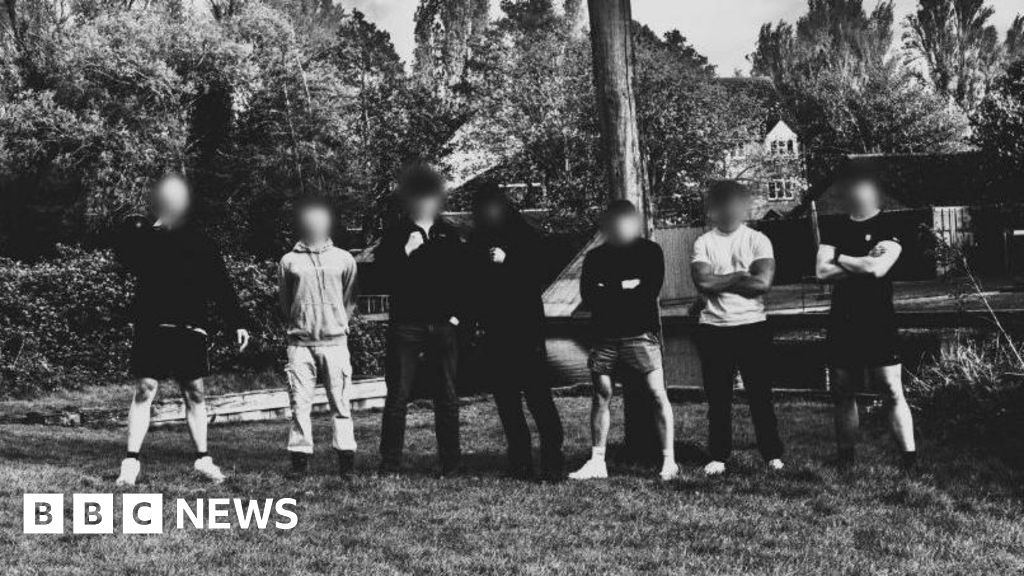
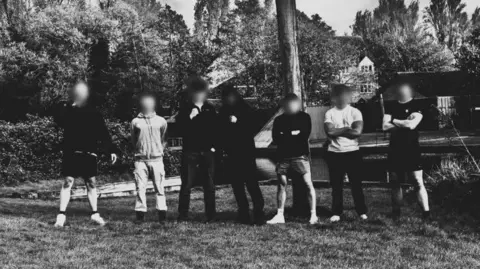 Telegram
TelegramAn extreme right-wing group with links to a violent white supremacist collective has been recruiting young men to support its efforts to “revive” what it called England’s “warrior culture” by masquerading as a sports club, a BBC investigation has found.
Active Club (AC), which hails World War Two Nazi leader Adolf Hitler as a hero, claims to be “peaceful and legal” and focus on male friendship and fitness.
However, it is connected to the Rise Above Movement (RAM), which played a key role in the Unite The Right rally in Charlottesville, Virginia, in 2017.
Extremism expert Alexander Ritzmann said it was using “the image of a sports club” to build a “militia” intent on “organised violence”.
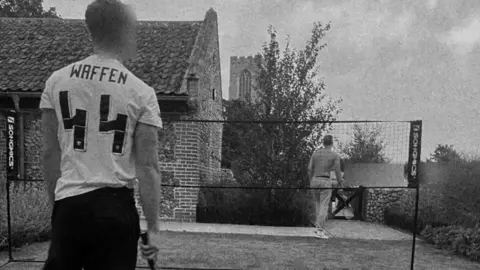 Telegram
TelegramSince the creation of the first AC in late 2020, it has been estimated that more than 100 clubs have been created in the US, Canada and Europe.
The group arrived in the UK in 2023 and has since set up branches in Northern Ireland, Scotland and various regions of England, including the North West, the Midlands, London and East Anglia.
An investigation by BBC North West found AC groups in the UK had upwards of 6,000 subscribers on the encrypted social media app Telegram.
Telegram has closed the group’s England page on at least four occasions, but the latest incarnation – established in mid-August – has almost 1,600 subscribers.
Its closed social networks contain:
- Photographs of members celebrating Hitler’s birthday with a swastika-covered cake
- Images of members wearing t-shirts emblazoned with the term Waffen-SS, the name of the Nazi combat branch during World War Two
- Evidence of recruits brandishing racist banners in public places
- Messages in the wake of the Southport stabbings encouraging people “not to sit idly by”
- Guidance on how to avoid police detection in the riots that followed those stabbings
Neo-Nazi fighting clubs going by the AC name have been promoted since 2020 by American far-right activist and RAM founder Robert Rundo.
Mr Rundo, who was arrested in Romania in 2023 at the request of the US authorities, was one of a number of people accused of rioting and conspiracy in relation to violence across the US in 2017.
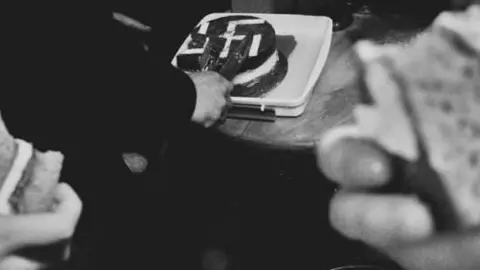 Telegram
TelegramIn a 30-minute telephone call which was secretly recorded by the BBC, a national organiser said AC wanted “guys who take things seriously”.
After questioning the journalist about their ethnicity, fitness, stance on religion, boxing or martial arts ability and ability to drive, he claimed the group, which only recruits men who are “white and of European heritage”, had “guys literally everywhere, in every region of England”.
“We’re trying to build a mass movement of strong, able-bodied, capable guys,” he said.
He added that the group was “peaceful and legal” and wanted to avoid getting shutdown because its members “couldn’t save their families and their friends and their people if they’re in jail cells”.
However, messages posted by AC page administrators often included reference to future violent conflict and the need to “revive the warrior culture of our nation”.
One post also called for members to “get on the streets… or risk your bloodline being scrubbed from existence”.
 Telegram
TelegramAlexander Ritzmann, a researcher with international organisation The Counter Extremism Project and an adviser to the European Commission’s Radicalisation Awareness Network, said he had “never seen a network in right-wing extremism grow so fast”.
He said AC was a “sophisticated operation” and warned if the movement was “allowed to continue to operate and multiply, the likelihood for targeted political violence will increase”.
He said its objective was “to build some sort of militia that hides behind the image of a sports club, while actually preparing for organised violence”.
“When they commit violence, members and groups will not publish a manifesto afterwards,” he said.
“This is different from other kinds of extreme right terrorism, where, after the attack a manifesto with all kinds of explanations and theories is published.”
He said if AC did go on to commit violent acts, they would do it “in disguise” and would not “leave any information behind about their real intention”.
“They might want to make this look like a pub fight or a fight on a bus or train… to avoid being exposed,” he said.
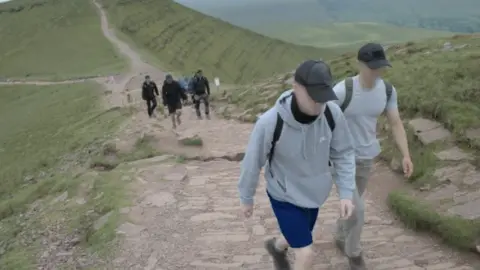 Telegram
TelegramIn a piece of research published earlier in 2024, anti-extremism campaign group Hope Not Hate alleged that AC had members who have made bomb threats and marched with the now-banned neo-Nazi terror group National Action.
For an act to formally be treated as terrorism by UK authorities, it must meet a series of legal tests in the Terrorism Act 2000, which include it involving serious violence or damage to property, having the aim of intimidation and being for the purpose of advancing a political, religious, racial or ideological cause.
Nick Aldworth, a former detective chief superintendent and UK counter-terrorism national co-ordinator, said AC’s UK posts had been “carefully crafted to intentionally avoid engaging with legislation and they deliberately make calls to action that ask for non-violence”.
“However, their intent is openly contradicted by symbols and imagery implying violent acts and connections to Nazism,” he said.
He said the posts “stop short of engaging with the Terrorism Act”, but what they did was “provide a body of evidence to support possible future proceedings should there be other material or actions that cross the offending threshold”.
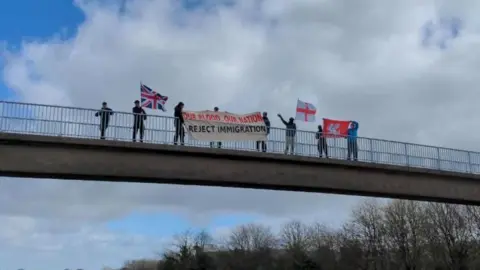 Telegram
TelegramNigel Bromage, who runs the anti-radicalisation charity Exit Hate after more than two decades in neo-Nazi groups, said the rise of AC in the UK was “worrying”.
He said the organiser who spoke to the BBC was “talking about building a mass movement, so this isn’t about small numbers”.
“This is about recruiting a large number of people who are going to be physically fit, who are going to obey a lot of rules and regulations and they’re going to be disciplined,” he said.
“When they’re saying they aren’t violent, that’s just a disclaimer to cover themselves.
“Why are they training? Why are they getting fit? Why are they talking about being so serious?
“I think all that is the hint at what they’re really about, which is preparing for their mythical race war that they believe is going to happen.”
 Reuters
ReutersA Counter Terrorism Policing representative said the scale of the extreme right wing terrorist threat in the UK had “steadily evolved over the past two decades”.
They said their officers’ “increasing casework” was driven by the “rising numbers of young people being drawn into the ideology through social media and online platforms”.
They said the unit carefully considered “information and intelligence relating to individuals and groups who promote extreme views” and should activity “cross into our area of responsibility… we will act swiftly and without hesitation”.
“There is no doubt that our dependence on digital spaces and networks is also having a profound effect on how extreme views may be formed, how individuals become radicalised, and how they can be recruited to extreme groups or organisations,” they said.
A government spokesperson said religious and racial hatred had “absolutely no place in our society”.
They said the government was “working to tackle the threat posed by extremist ideologies and respond to growing and changing patterns of extremism across the UK”.
AC did not respond to the BBC’s request for comment.
Telegram has been approached for comment.
Related
Youth football teams hold minute’s silence for 10-year-old Poppy Atkinson
Youth football teams and grassroots clubs across the country have held a minute’s silence at the start of their games to commemorate a 10-year-old girl who di
Girl’s death sparks minute’s silence at football matches nationwide
10-year-old Poppy Atkinson was killed when she was struck by a car during a training session at Kendal Rugby Club in Cumbria. Clubs from Leeds to London
Liverpool fans’ Uefa claim can be heard in England, judge…
The high court, sitting in Liverpool, heard Uefa had relied upon the principle that English courts will not inquire into the legality of actions by foreign gove
Alan Shearer’s Premier League predictions including Manchester United vs Arsenal
Caption: Alan Shearer?s Premier League predictions credit: Getty / Metro After some impressive results for English sides in Europe the focus is













